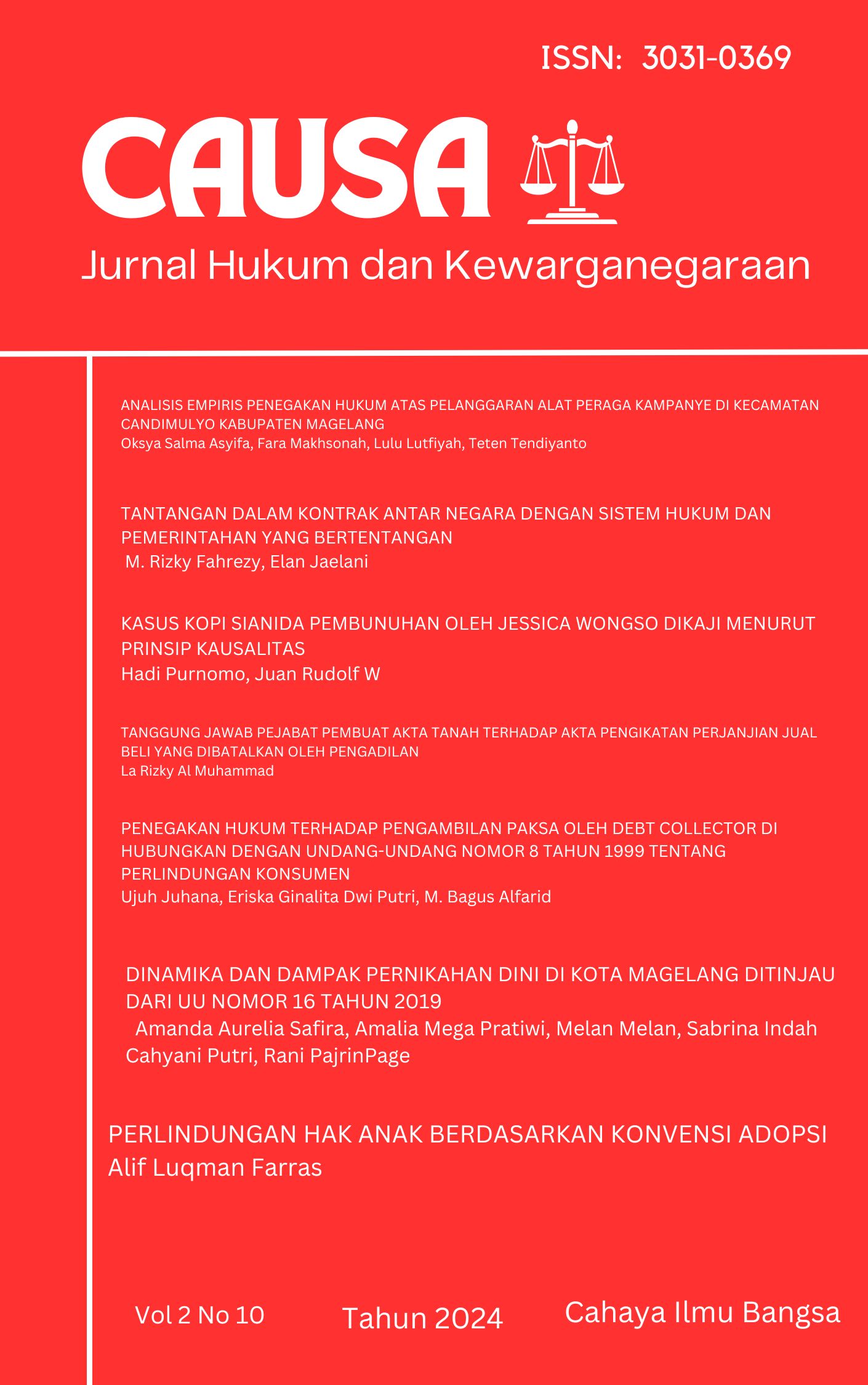PRAKTIK PEMBEBANAN BIAYA TAMBAHAN PADA KREDIT MACET OLEH BANK DALAM PERSPEKTIF HUKUM PERDATA DAN PELINDUNGAN KONSUMEN
- Authors
-
-
Bagas Arya Jatmika
Universitas PadjadjaranAuthor -
Etty Mulyati
Universitas PadjadjaranAuthor -
Agus Suwandono
Universitas PadjadjaranAuthor
-
- Keywords:
- Kredit Macet, Nasabah Debitur, Perbankan, Pelindungan Konsumen , Non-Performing Loan, Debtor Costomer, Banking, Consumer Protection
- Abstract
-
Pembebanan biaya tambahan terhadap nasabah debitur yang mengalami kredit macet merupakan praktik yang berisiko melanggar ketentuan hukum perdata dan prinsip pelindungan konsumen di sektor jasa keuangan. Meskipun bank memiliki hak menuntut ganti rugi atas kerugian akibat wanprestasi debitur, hak tersebut dibatasi oleh Pasal 1246 dan 1247 KUHPerdata yang menekankan bahwa kerugian haruslah timbul langsung dan dapat diduga saat perjanjian dibuat. Praktik pembebanan biaya tambahan tanpa dasar yang jelas juga bertentangan dengan prinsip keterbukaan, keadilan, dan kepatuhan sebagaimana diatur dalam Pasal 3 ayat (2) serta Pasal 62 ayat (1) POJK Nomor 22 Tahun 2023 tentang Pelindungan Konsumen dan Masyarakat di Sektor Jasa Keuangan. Penelitian ini menggunakan metode yuridis normatif dengan pendekatan peraturan perundang-undangan dan yurisprudensi untuk menganalisis keabsahan pembebanan biaya tambahan tersebut. Hasil penelitian menunjukkan bahwa tindakan bank tersebut tidak hanya bertentangan dengan ketentuan KUHPerdata dan POJK, tetapi juga berpotensi merugikan nasabah debitur secara sepihak. Nasabah debitur dalam hal ini memiliki hak untuk memperoleh pelindungan hukum baik secara preventif maupun represif, termasuk melalui mekanisme penyelesaian sengketa di OJK, LAPS-SJK, atau melalui gugatan pengadilan.
The imposition of additional charges on debtor customers experiencing non-performing loans constitutes a practice that risks violating civil law provisions and consumer protection principles in the financial services sector. Although banks have the right to claim compensation for losses resulting from the debtor's breach of contract, this right is limited by Articles 1246 and 1247 of the Indonesian Civil Code, which emphasize that damages must arise directly and be foreseeable at the time the agreement was made. The practice of imposing additional charges without a clear legal basis also contradicts the principles of transparency, fairness, and compliance as stipulated in Article 3 paragraph (2) and Article 62 paragraph (1) of Financial Services Authority Regulation (POJK) Number 22 of 2023 concerning Consumer and Community Protection in the Financial Services Sector. This research employs a normative juridical method with a statutory and jurisprudential approach to analyze the legality of such impositions. The results of the study indicate that the bank’s actions not only contradict the provisions of the Civil Code and the POJK, but also potentially harm debtor customers unilaterally. In this regard, debtor customers are entitled to legal protection both preventively and repressively, including through dispute resolution mechanisms via the Financial Services Authority (OJK), the Financial Services Sector Alternative Dispute Resolution Institution (LAPS-SJK), or through court litigation.
- Downloads
- Published
- 2025-06-20
- Section
- Articles
How to Cite
Similar Articles
- Putri Sofiani Danial, PRAKTIK PENAGIHAN ABUSIF OLEH PINJAMAN ONLINE ILEGAL: KETIMPANGAN AKSES KEADILAN DAN PERLINDUNGAN KONSUMEN DI INDONESIA , Causa: Jurnal Hukum dan Kewarganegaraan: Vol. 13 No. 4 (2025): Causa: Jurnal Hukum dan Kewarganegaraan
- Zayyan Syafiqah Aggistri, Wilma Silalahi, PERLINDUNGAN KONSUMEN TERHADAP IKLAN TIDAK TRANSPARAN OLEH INFLUENCERDI TIKTOK DALAM PERSPEKTIF HUKUM POSITIF INDONESIA , Causa: Jurnal Hukum dan Kewarganegaraan: Vol. 14 No. 3 (2025): Causa: Jurnal Hukum dan Kewarganegaraan
- Nawal Essam Yahia, Cindy Debora Bestaida Nadapdap, Nabil Raditya Tjokronolo, Chelsea Kairadinda Adam, Atik Winanti, PERLINDUNGAN KONSUMEN DALAM KASUS KECELAKAAN SELUNCURAN KOLAM RENANG SURABAYA , Causa: Jurnal Hukum dan Kewarganegaraan: Vol. 14 No. 3 (2025): Causa: Jurnal Hukum dan Kewarganegaraan
- Salwa Rahmah Asysyifa Prasad, IMPLIKASI HUKUM BAGI PERLINDUNGAN KONSUMEN DALAM TRANSAKSI PENIPUAN ONLINE , Causa: Jurnal Hukum dan Kewarganegaraan: Vol. 15 No. 7 (2025): Causa: Jurnal Hukum dan Kewarganegaraan
- Amanda Yulia Mawar Dani, Aliah Reski Yanti, Raodatul Jannah, Ulfa Ulfa, Kamaruddin Arsyad, PERLINDUNGAN HUKUM TERHADAP NASABAH DALAM KONTRAK IJARAH: STUDI KASUS BANK SYARIAH INDONESIA KCP GOWA , Causa: Jurnal Hukum dan Kewarganegaraan: Vol. 14 No. 11 (2025): Causa: Jurnal Hukum dan Kewarganegaraan
- Yoan Shevila Kristiyenda, Tasya Safiranita Ramli, Pelindungan Hukum bagi Nasabah Bank Digital terhadap Ancaman Pencurian Data melalui BTS Palsu (Fake BTS) , Causa: Jurnal Hukum dan Kewarganegaraan: Vol. 13 No. 2 (2025): Causa: Jurnal Hukum dan Kewarganegaraan
- Alita Aulia Maliq, Aulia Najla Faliskha, Denanda Zahra Ajrina , Swastika Rahmadhani, PERLINDUNGAN HUKUM BAGI KONSUMEN DALAM KASUS PENIPUAN UMRAH: ANALISIS TERHADAP PUTUSAN 41/PID.B/2024/PN.KDS , Causa: Jurnal Hukum dan Kewarganegaraan: Vol. 14 No. 3 (2025): Causa: Jurnal Hukum dan Kewarganegaraan
- Cindy Valentina, Baidhowi Baidhowi, PERLINDUNGAN HUKUM BAGI NASABAH DALAM AKAD MURUBAHAH DI BANK SYARIAH , Causa: Jurnal Hukum dan Kewarganegaraan: Vol. 13 No. 9 (2025): Causa: Jurnal Hukum dan Kewarganegaraan
- Alicia Syahla Dewi Wibowo, Alya Najwa Zulfa, Raden Roro Kamilia Hana Putri, Agnesya Putri Siahaan, Syafira Ramadhanti, Irwan Triadi, PERLINDUNGAN KONSUMEN DALAM TRANSAKSI E-COMMERCE LINTAS NEGARA: TANTANGAN HUKUM DAN IMPLIKASINYA TERHADAP PERDAGANGAN INTERNASIONAL , Causa: Jurnal Hukum dan Kewarganegaraan: Vol. 14 No. 7 (2025): Causa: Jurnal Hukum dan Kewarganegaraan
- Salwa Rahmah Asysyifa Prasad, EFEKTIVITAS PENDAFTARAN JAMINAN FIDUSIA SEBAGAI PERLINDUNGAN HUKUM BAGI KREDITOR : TINJAUAN TERHADAP UU JAMINAN FIDUSIA , Causa: Jurnal Hukum dan Kewarganegaraan: Vol. 15 No. 7 (2025): Causa: Jurnal Hukum dan Kewarganegaraan
You may also start an advanced similarity search for this article.

